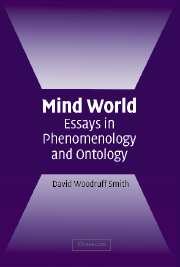Book contents
- Frontmatter
- Contents
- Prolegomena: The Terroir of Consciousness and the World
- Origins of the Essays
- Overview: A Story Line
- The Picture
- 1 Three Facets of Consciousness
- 2 The Cogito circa a.d. 2000
- 3 Return to Consciousness
- 4 Consciousness in Action
- 5 Background Ideas
- 6 Intentionality Naturalized?
- 7 Consciousness and Actuality
- 8 Basic Categories
- Coda: The Beetle in the Box
- Appendix: Background Conceptions of Ontology, Phenomenology, Philosophy of Mind, and Historical Philosophy
- Index
- References
1 - Three Facets of Consciousness
Published online by Cambridge University Press: 05 June 2012
- Frontmatter
- Contents
- Prolegomena: The Terroir of Consciousness and the World
- Origins of the Essays
- Overview: A Story Line
- The Picture
- 1 Three Facets of Consciousness
- 2 The Cogito circa a.d. 2000
- 3 Return to Consciousness
- 4 Consciousness in Action
- 5 Background Ideas
- 6 Intentionality Naturalized?
- 7 Consciousness and Actuality
- 8 Basic Categories
- Coda: The Beetle in the Box
- Appendix: Background Conceptions of Ontology, Phenomenology, Philosophy of Mind, and Historical Philosophy
- Index
- References
Summary
Abstract: Over the past century phenomenology has ably analyzed the basic structures of consciousness as we experience it. Yet recent philosophy of mind, concerned more with brain activity and computational function, has found it difficult to make room for the structures of subjectivity and intentionality that phenomenology has appraised. In order to understand consciousness as something that is both subjective and grounded in neural activity, we need to delve into phenomenology and ontology. I draw a fundamental distinction in ontology among the form, appearance, and substrate of any entity. Applying this three-facet ontology to consciousness, we distinguish the intentionality of consciousness (its form); the way we experience consciousness (its appearance, including so-called qualia); and the physical, biological, and cultural basis of consciousness (its substrate). We can thus show how these very different aspects of consciousness fit together in a fundamental ontology. And we can thereby define the proper domains of phenomenology and other disciplines that contribute to our understanding of consciousness.
The Problem of Consciousness
Lately, philosophers and scientists have been looking for mind in all the wrong places. Physicalists of all stripes have focused primarily on the physical conditions of consciousness, from neural activity to computational function. Meanwhile, humanists – historicists, postmodernists, culture critics – have looked primarily to the cultural conditions of our discourse, as if consciousness did not exist in its own right (expressed in art and literature) but is “theorized” in a cultural tradition of phenomenology or science or humanistic discourse.
- Type
- Chapter
- Information
- Mind WorldEssays in Phenomenology and Ontology, pp. 10 - 41Publisher: Cambridge University PressPrint publication year: 2004



